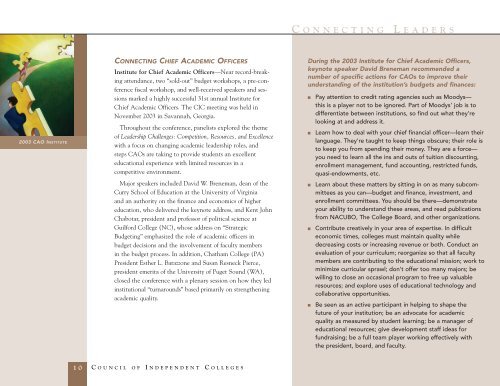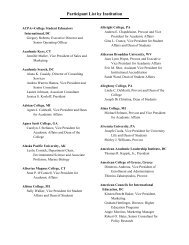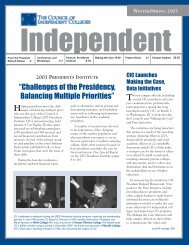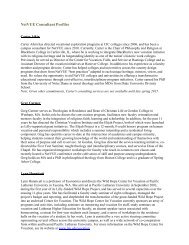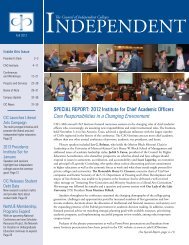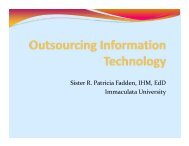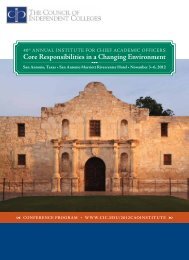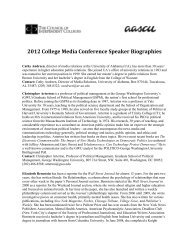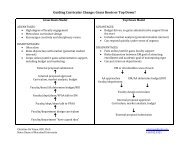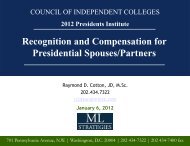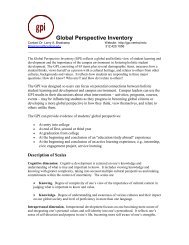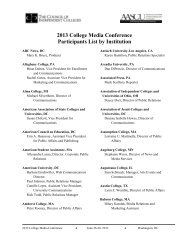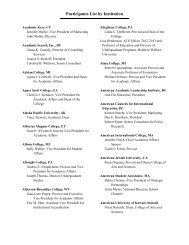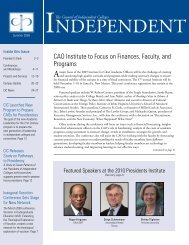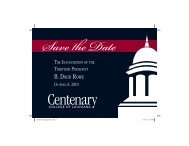Annual Report 2003-2004 - The Council of Independent Colleges
Annual Report 2003-2004 - The Council of Independent Colleges
Annual Report 2003-2004 - The Council of Independent Colleges
- No tags were found...
Create successful ePaper yourself
Turn your PDF publications into a flip-book with our unique Google optimized e-Paper software.
C ONNECTINGL EADERS<strong>2003</strong> CAO INSTITUTECONNECTING CHIEF ACADEMIC OFFICERSInstitute for Chief Academic Officers—Near record-breakingattendance, two “sold-out” budget workshops, a pre-conferencefiscal workshop, and well-received speakers and sessionsmarked a highly successful 31st annual Institute forChief Academic Officers. <strong>The</strong> CIC meeting was held inNovember <strong>2003</strong> in Savannah, Georgia.Throughout the conference, panelists explored the theme<strong>of</strong> Leadership Challenges: Competition, Resources, and Excellencewith a focus on changing academic leadership roles, andsteps CAOs are taking to provide students an excellenteducational experience with limited resources in acompetitive environment.Major speakers included David W. Breneman, dean <strong>of</strong> theCurry School <strong>of</strong> Education at the University <strong>of</strong> Virginiaand an authority on the finance and economics <strong>of</strong> highereducation, who delivered the keynote address, and Kent JohnChabotar, president and pr<strong>of</strong>essor <strong>of</strong> political science atGuilford College (NC), whose address on “StrategicBudgeting” emphasized the role <strong>of</strong> academic <strong>of</strong>ficers inbudget decisions and the involvement <strong>of</strong> faculty membersin the budget process. In addition, Chatham College (PA)President Esther L. Barazzone and Susan Resneck Pierce,president emerita <strong>of</strong> the University <strong>of</strong> Puget Sound (WA),closed the conference with a plenary session on how they ledinstitutional “turnarounds” based primarily on strengtheningacademic quality.During the <strong>2003</strong> Institute for Chief Academic Officers,keynote speaker David Breneman recommended anumber <strong>of</strong> specific actions for CAOs to improve theirunderstanding <strong>of</strong> the institution’s budgets and finances:■■■■■Pay attention to credit rating agencies such as Moodys—this is a player not to be ignored. Part <strong>of</strong> Moodys’ job is todifferentiate between institutions, so find out what they’relooking at and address it.Learn how to deal with your chief financial <strong>of</strong>ficer—learn theirlanguage. <strong>The</strong>y’re taught to keep things obscure; their role isto keep you from spending their money. <strong>The</strong>y are a force—you need to learn all the ins and outs <strong>of</strong> tuition discounting,enrollment management, fund accounting, restricted funds,quasi-endowments, etc.Learn about these matters by sitting in on as many subcommitteesas you can—budget and finance, investment, andenrollment committees. You should be there—demonstrateyour ability to understand these areas, and read publicationsfrom NACUBO, <strong>The</strong> College Board, and other organizations.Contribute creatively in your area <strong>of</strong> expertise. In difficulteconomic times, colleges must maintain quality whiledecreasing costs or increasing revenue or both. Conduct anevaluation <strong>of</strong> your curriculum; reorganize so that all facultymembers are contributing to the educational mission; work tominimize curricular sprawl; don’t <strong>of</strong>fer too many majors; bewilling to close an occasional program to free up valuableresources; and explore uses <strong>of</strong> educational technology andcollaborative opportunities.Be seen as an active participant in helping to shape thefuture <strong>of</strong> your institution; be an advocate for academicquality as measured by student learning; be a manager <strong>of</strong>educational resources; give development staff ideas forfundraising; be a full team player working effectively withthe president, board, and faculty.10C OUNCIL OF I NDEPENDENT C OLLEGES


